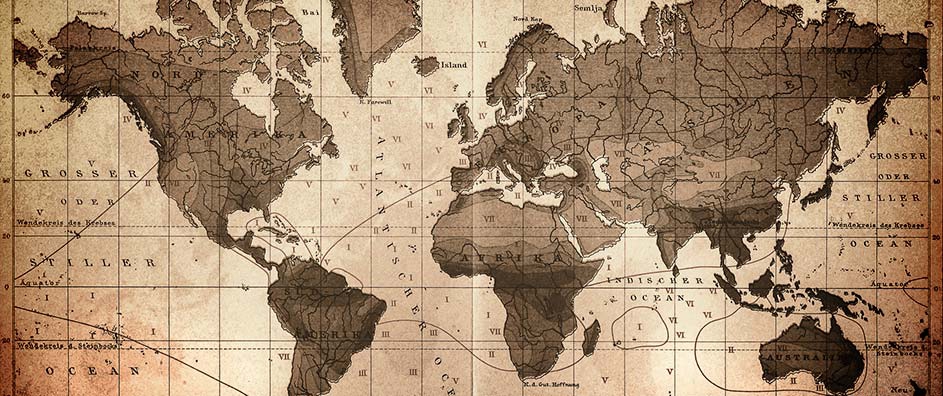The views expressed in our content reflect individual perspectives and do not represent the authoritative views of the Baha'i Faith.
One of the most prevalent (and least original) current political slogans has to be “Take Back Our Country!”
That revisionist, revanchist motto resounded in the UK Brexit campaign, on the part of those who voted to leave the European Union, and now the sentiment has spread to other countries in Europe like France and the Netherlands, as well. You can hear it in many American political campaigns, too, and even in places like Australia and the nations of South America. Just judging from its geographic spread, it seems to have a weird appeal—but what does it really mean?
After all, no one has physically or even symbolically taken anyone else’s country away—all of the world’s nations still exist, pretty much as they have for a while now, their borders intact and their governments more or less in place. I suppose nations like the Ukraine could legitimately say “Take Back Our Country!”, but I can’t think of anyone else who would have a similar claim against recent aggressive hegemony.
Perhaps, I might suggest, what the “Take Back Our Country” slogan really refers to is time.
Many, many people, especially those with more than a few dozen birthday candles on their cakes, have a longing to return to the past. I know I do sometimes. Change scares folks. The future approaches with blinding speed and enormous newness, so the past seems much more familiar and calm and comfortable. We seek consolation in those memories—and because of the way the human brain and memory work, we tend to forget the not-so-wonderful parts of our past, and only recall the glorious, gauzy visions of an idealized time gone by. That sentimental yearning for a romanticized past—the “good old days”—can even block historical facts.
Of course, we all rationally know that the past is gone, and it ain’t coming back.
But our emotions don’t always conform to logic. We still feel that we can somehow reach back into the past and re-create it. To appeal to those emotions, many of the reactionary forces in society, those particularly opposed to change, try to market a nostalgic version of the past: Weren’t things wonderful back then? Couldn’t we just return to what things used to be like? Shouldn’t we, in the face of all the changes a globalizing world presents, “take our country back?”
It’s a tempting message, right?
It may be tempting, but it’s also patently false. At its heart, when you think about it, it’s a big lie: we can go back in time to a better place. Even though we know that’s not possible, some people buy into it. They badly want to steer the ship of state backwards, away from the new. They want a more homogeneous and less global society. They want to remain in power, or continue generating profits, or keep the status quo because it benefits them in some way. They’re scared of the future. They know it creates change, and that change means their privileges may lapse.
The “Take Our Country Back!” slogan applies most prominently to those who value national identity over a more global one; to those who struggle with the opportunities and pressures of immigration and globalization; to those who want to sell us a past-tense, nostalgic version of nativism and nationalism for their own interests.
But the era of nationalism is over. With each passing day, the world shrinks into a smaller and smaller neighborhood. Communication, transportation, education and information have all gone global. Every futurist knows that globalization, along with all of its benefits, challenges and difficulties, forms the future. A limited patriotism, a nativist outlook and a nationalistic worldview can’t take us back to the past—it can only prevent us from fully entering the future:
Patriotism is, fundamentally, a conviction that a particular country is the best in the world because you were born in it… – George Bernard Shaw
Each one owes infinitely more to the human race than to the particular country in which he was born. – Francois Fenelon
Our true nationality is mankind. – H. G. Wells
It is not easy to see how the more extreme forms of nationalism can long survive when men have seen the Earth in its true perspective as a single small globe against the stars. – Arthur C. Clarke
It is not for him to pride himself who loveth his own country, but rather for him who loveth the whole world. The earth is but one country, and mankind its citizens. – Baha’u’llah, Tablets of Baha’u’llah, p. 167.
If we look forward toward the future, we can all see the horizon. It looks stationary, but it’s not. The Earth only turns in one direction, and clocks never run backwards. Stand in a river sometime, and look downstream. That’s time, moving away from you, the past receding further and further every minute. Now turn around and look upstream—that’s the future, coming toward you. You’re much better off, much safer and more secure, when you keep your eyes on the upstream side.
If you point yourself toward the future in that way, you’ll see that everything which rises must converge:
O my Lord, reveal through them the ensign of Unity among mankind and the flag of Love between nations, so that multiplicities may converge into the centre of oneness and harmony, the veils of hatred be rent asunder, the conditions of discord pass away and enmity and rancor vanish from the world of man, so that after disunion the Beloved of Union shall unveil her countenance, animosity be changed into affection, the reign of faction and feud come to an end, and success and prosperity be attained. – Abdu’l-Baha, Star of the West, Volume 1, p. 2.
Next: Does an Open World Mean Mass Migration?
You May Also Like
Comments

















of blaming their victims for "taking"
something from us. Didn't Hitler think Germany's former glory had
been taken, not to mention its
population's genetic purity? Senator
McCarthy claimed the Communists
were taking over the government.
"States' rights" politicians said Washington was taking their power of self-determination. If it's too
hard to gather specifics, or if there
aren't many to find, a classic phrase
for what's being threatened is "our way of life"!